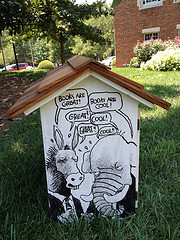April 21-27 is Preservation Week – a week dedicated to educating the community on the importance of preserving our historic documents and objects. Preservation Week was created in 2010 to highlight the hundreds of millions of items in libraries, museums, and other institutions that are at risk of being damaged or lost due to a lack of resources for proper care.
In addition, Preservation Week highlights the importance of having an emergency plan to protect important documents in case of disaster. While protecting cultural treasures held in archives, museums, and city governments like Decatur is crucial, it is equally important to protect our personal documents and treasured photographs.
Thanks to collaboration between organizations like the Library of Congress, the Society of American Archivists, and the Institute of Museum and Library Services, some great, free resources are available online to help you learn how to protect your family treasures. There are some very simple steps you can take, starting with ensuring that your family photos, albums, and other documents are located in a climate-controlled part of your house. In other words, get them out of the attic or basement, where extreme temperatures and humidity can speed up deterioration. Second, make copies, either digital or photocopies, or both. With especially fragile, older family photos or letters, it is important to minimize handling the original, so you may want to frame a copy and store the original in a polyester sleeve in an acid-free box. This is what my family has done with a 1900s photograph of my great-grandmother and her sisters. Each of us has a quality copy of the original on photo paper.
Being prepared in case of a disaster is also important. Being from New Orleans, Hurricane Katrina heightened awareness for me to the importance of being prepared in case of an evacuation. It is a good idea to institute a “go box” which contains birth certificates, social security cards, family photos and other important documents. You can put anything you want into your family’s “go box,” but vital records that are difficult to replace if your home is damaged are the most important. Certainly, there are many types of emergency events that provide little to no warning time, but having your family’s important documents ready to go is always a good idea.
For more information, check out “Quick Preservation Tips”:
http://atyourlibrary.org/passiton/preserving-your-treasures
The above site also offers several links to free webcasts on topics ranging from preserving family documents to how to manage your digital photographs.
This site contains phone numbers for 24 hour disaster recovery preservation hotlines, as well as links to finding a conservator and caring for documents after different types of disasters:













